
Q. Can I print data on an envelope or postcard?
A. Yes, you can also print on envelopes and postcards.
Execute a print job on your computer then load envelopes or postcards into this machine to execute a print job on it.
For details on the operation procedure, refer to Printing on Envelopes or Postcards.
Q. Can I print on custom size paper?
A. Yes, you can.
Load paper into the tray compatible with the custom size. For details on the specifications for the paper tray, refer to Paper.
On the Print screen, specify the tray containing custom size paper; this will enable you to print on custom size paper. For details on the setting procedure, refer to Printing on custom-size paper ([Original Size]).
Q. Can I directly print a file in a USB memory device?
A. Yes. You can print a file simply by inserting the USB memory into the USB Port of the machine.
For details on the operation procedure, refer to Directly Printing from USB Flash Drive.
Q. How can I install the printer driver?
A. The installation procedure varies depending on the operating system of the relevant computer.
For Windows, refer to Easy Installation Process of the Printer Driver.
For macOS, refer to Setting Up the Computer.
Q. Can I use the printer function in a wireless LAN environment?
A. It is available when the optional Wireless LAN Interface Kit is installed.
In some cases, you need to apply the latest firmware. For details, contact your service representative.
Q. What should I do to print data in an environment with user authentication enabled?
A. When you print, you need to enter a user name and password in the printer driver.
For details on the operation procedure, refer to Setting authentication information on your computer.
Q. How can I simultaneously perform authentication and printing on the machine when user authentication is enabled?
A. You can use the ID & Print function.
For details on the operation procedure, refer to Printing Simultaneously with Authentication on This Machine ([ID&Print]).
Q. Can printing be restricted by user?
A. Yes. You can set user authentication to restrict printing by user. That enables output control by user, leading to cost reductions.
For details on how to restrict use of the print functions for each user, refer to Restricting available functions for each user.
For details on how to specify the maximum number of printable sheets for each user, refer to Managing the maximum number of printable pages by user.
Q. How can I configure the setting to make the authentication window pop up so that a user does not forget to enter authentication information when data is to be printed?
A. In the Properties window of the printer, configure the setting to display the authentication setting pop-up window when data is to be printed.
Change the following setting on the [Printer properties] screen of the printer driver. For details on how to display the [Printer properties] screen, refer to How to display the [Printer properties] window.
In the [Settings] tab, click [Authentication Settings...].
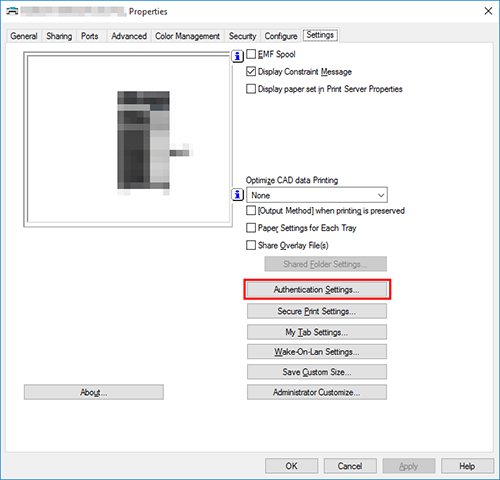
In [Authentication/Account Track], select the [Popup Authentication Dialog when printing] check box, then click [OK].
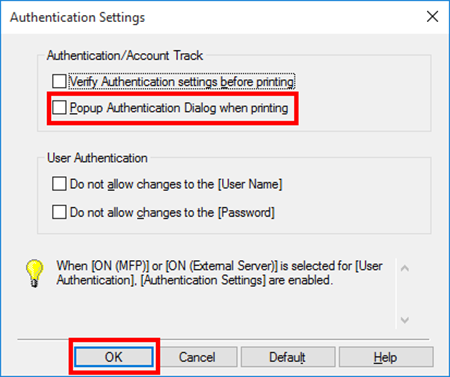
Q. Although user authentication has been successful, the input screen in the driver is grayed out.
A. In the printer driver, change the user authentication to the correct setting.
Change the following setting on the [Printer properties] screen of the printer driver. For details on how to display the [Printer properties] screen, refer to How to display the [Printer properties] window.
Select [User Authentication] from [Device Option] in the [Configure] tab, and select the authentication status from [Setting]. Then, click [OK]. For the authentication status to be specified, contact the administrator of this machine.
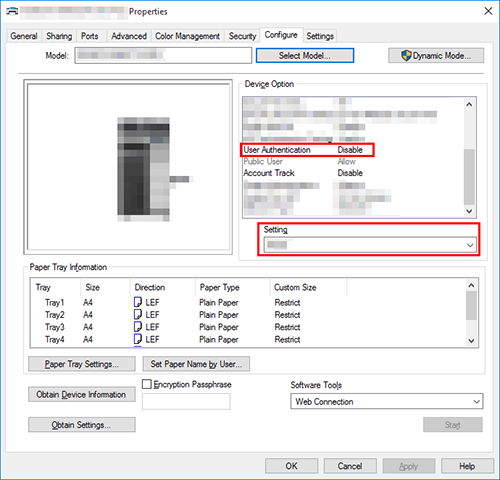
Q. Can I specify the resolution for printing?
A. You can select [Resolution] on the [Quality] tab of the printer driver to specify the resolution for printing.
For details on the operation procedure, refer to Specifying the Resolution for Printing ([Resolution]).
Q. Can I configure a setting to skip blank pages in the original?
A. Select [Skip Blank Pages] in the [Layout] tab of the printer driver to skip blank pages when printing the original.
For details on the operation procedure, refer to Skipping Blank Pages for Printing ([Skip Blank Pages]).
Q. How can I print out highly confidential data without a risk of exposure to others?
A. You can use either Secure Print or ID & Print.
With the Secure Print function, a password is assigned to the document. You can enter the password on the screen of this machine to print the document. The ID & Print function enables printing of a document upon entry of the user name and password registered for user authentication. You can enter the user name and password on the screen of this machine to print the document.
Secure Print is useful for giving printing permission to a limited number of users who know the password assigned to the document. ID & Print only enables the login user to perform printing.
For details on Secure Print, refer to Printing Highly Confidential Documents ([Secure Print]).
For details on ID & Print, refer to Printing Simultaneously with Authentication on This Machine ([ID&Print]).
- User authentication is a function for limiting access to this machine to registered users. ID & Print can only be used when user authentication is enabled.
Q. Characters become garbled when I print. Can I print without garbled characters being produced?
A. Yes. Try bitmap printing.
Click [Font Settings...] in the [Quality] tab of the printer driver.
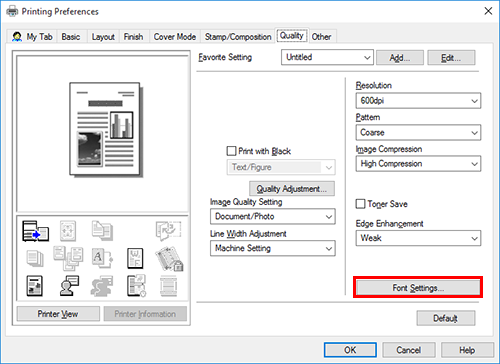
Select [Bitmap] from [Download Font Format], then click [OK]. You can also eliminate garbled characters by clearing the [Use Printer Fonts] check box.
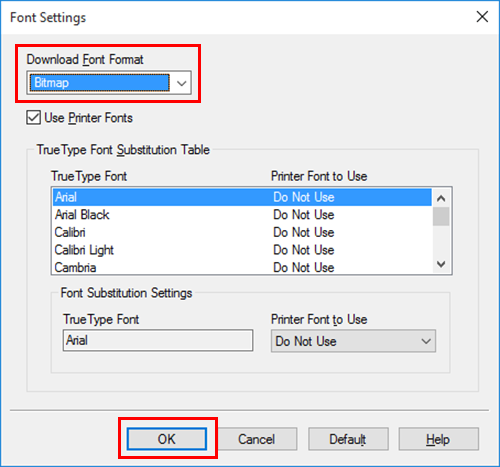
Q. Can I print the cover and chapter cover on a different type of paper?
A. Yes. You can specify a different paper tray for the cover or the chapter cover for printing them on a different type of paper.
For details on the operation procedure, refer to Printing Only the Cover and Chapter on a Different Type of Paper.


Q. Can I change the driver print setting screen to a dedicated item?
A. Yes. You can easily customize the window from the properties window of the printer driver by registering frequently used functions en masse on My Tab or registering settings for respective tabs as your favorite for quick activation.
For details on the My Tab setting procedure, refer to Customizing the setting window.
For details on the Favorite setting procedure, refer to Registering frequently used print settings.
Q. Are there any paper-saving printing methods?
A. You can save paper by printing more than one original page onto the same side of a single sheet of paper or printing on both sides of sheets of paper.
For details on the operation procedure, refer to Saving the Number of Printed Sheets.


Q. Can I print on very long sheets of paper such as a banner?
A. Yes, you can print on a banner or other long sheet of paper by using the Banner Printing function.
For details on the operation procedure, refer to Printing on Banner Paper.
- An option is required to load banner paper. For details on the required option, refer to "List of Functions with Options Required" in [User's Guide [About This Machine]].
Q. How can I change the paper size and type settings?
A. You can change them in the print screen.
Select the paper size from [Paper Size] in the [Basic] tab of the printer driver.
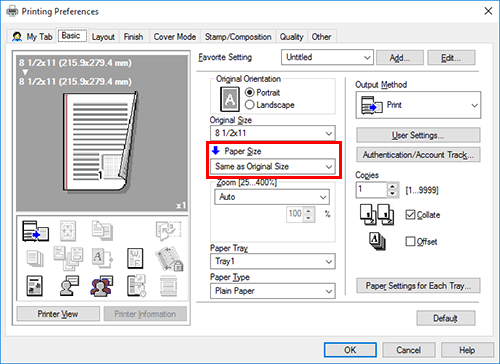
Select the relevant paper type from [Paper Type], then click [OK].
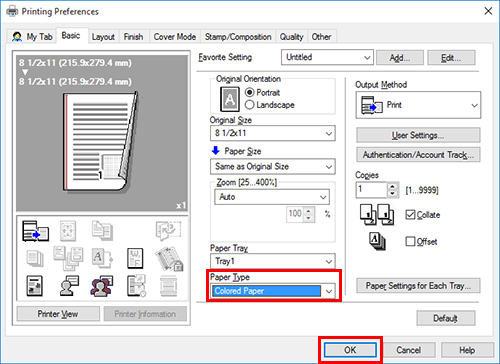
Q. Can I print characters and images so as to have them overlapped?
A. Yes, you can print with a watermark (text stamp) or a header/footer.
Also, an overlay function is provided that enables printing over an output from a file saved on a computer.
(1) Watermark
For details on the operation procedure, refer to Adding a watermark ([Watermark]).

(2) Header/Footer
For details on the operation procedure, refer to Adding information to the header/footer ([Header/Footer]).

(3) Overlay
For details on the operation procedure, refer to Composing an overlay image ([Overlay]).

Q. How can I print out data as clearly as possible?
A. Simply select the type of the document to print, and the setting is automatically changed to the optimal for clear printing.
For details on the operation procedure, refer to Selecting the optimum image quality for the original ([Image Quality Setting]).
Q. Can I adjust the printing position in the layout setting?
A. You can shift and adjust the position of the entire print image by setting the binding margin or image shift.
(1) Page Margin
For details on the operation procedure, refer to Adding a margin on pages ([Binding Margin]).

(2) Image Shift
For details on the operation procedure, refer to Fine-tuning the print position ([Image Shift]).

Q. What types are available for printing finish?
A. Various finish modes are available according to the options installed on this machine, such as stapling, punching and binding.
(1) Staple
For details on the operation procedure, refer to Stapling paper ([Staple]).

(2) Punch
For details on the operation procedure, refer to Punching the printed sheets ([Punch]).

(3) Center Staple & Fold
For details on the operation procedure, refer to Binding in the center of the paper ([Center Staple and Fold]).

(4) Fold
For details on the operation procedure, refer to Folding paper ([Fold]).

- To use the finishing function, an option is required. For details on the required option, refer to "List of Functions with Options Required" in [User's Guide [About This Machine]].
Q. Can I print from a macOS PC using a USB connection?
A. It is not supported. You can print data from a macOS PC via the network.
Q. Which file type is available for printing in E-mail RX Print?
A. The available file types are PDF, Compact PDF, JPEG, TIFF, XPS, Compact XPS, OOXML (.docx/.xlsx/.pptx), and PPML (.ppml/.vdx/.zip). However, a banner-size file cannot be printed.
- To use this function, an option is required. For details on the required option, refer to "List of Functions with Options Required" in [User's Guide [About This Machine]].
- It is not guaranteed that all printing can be carried out. Printing may cause a failure even if the specified file type is available.
Q. I want to skip the number on the front cover when adding page numbers for printing. How can I configure the setting to print the second page in the same way as the first page?
A. When specifying [Page Number] on the printer driver, set [Starting Page] to [2].
For details on the operation procedure, refer to Adding Page Numbers Other Than the Cover Page when Printing.
Q. Can I operate the files saved in the User Box of this machine with Secure Print from the basic style screen?
A. Yes, you can.
Tap [Secure Print] in [Useful Apps] of the home screen of basic style.
For details on the operation procedure, refer to Operating the User Box in Basic Style ([Secure Print]).

 in the upper-right of a page, it turns into
in the upper-right of a page, it turns into  and is registered as a bookmark.
and is registered as a bookmark.